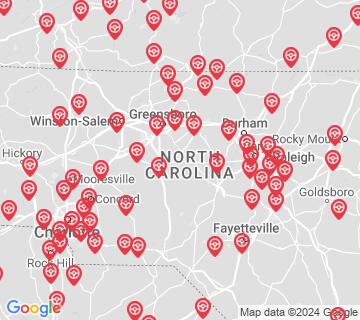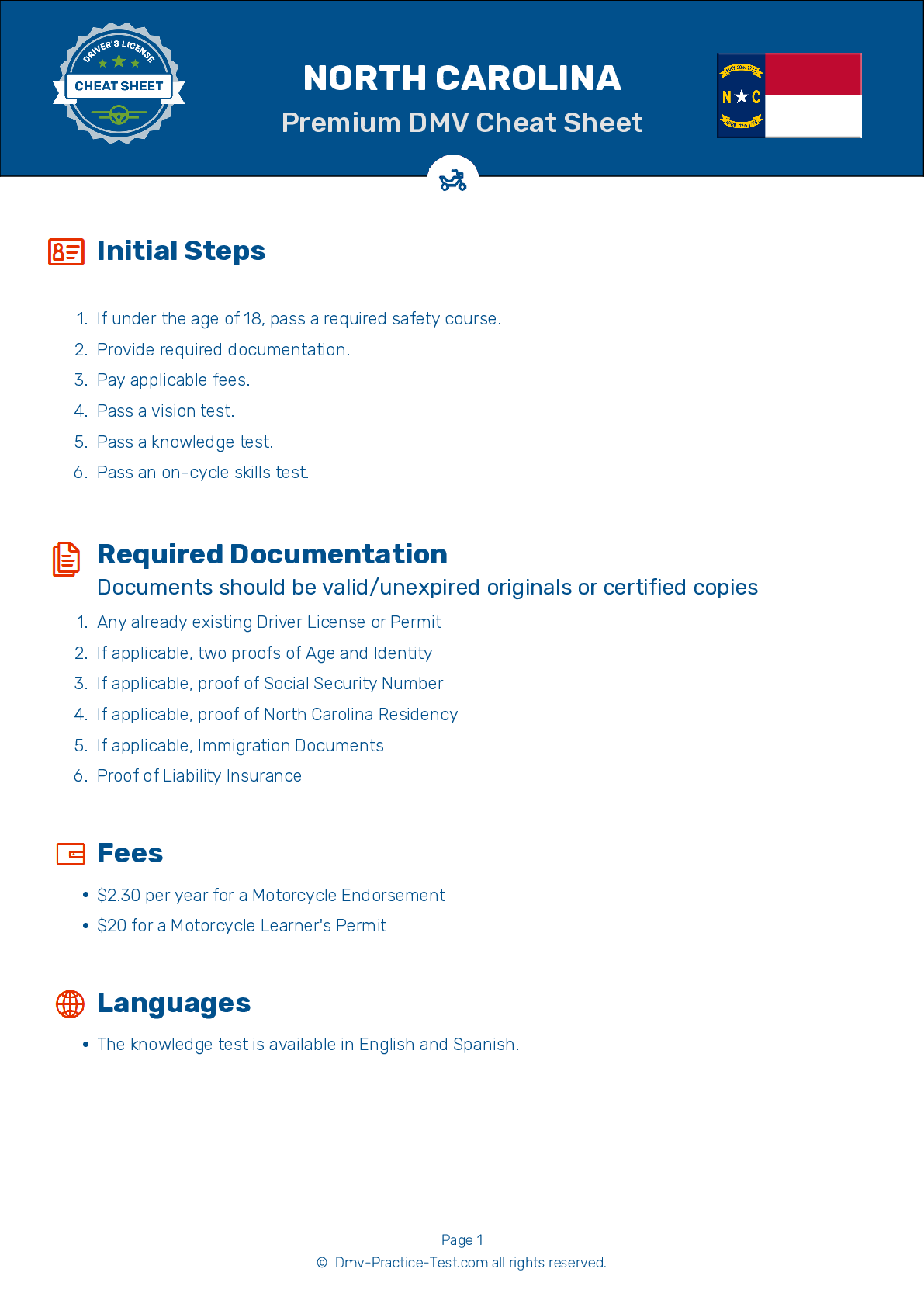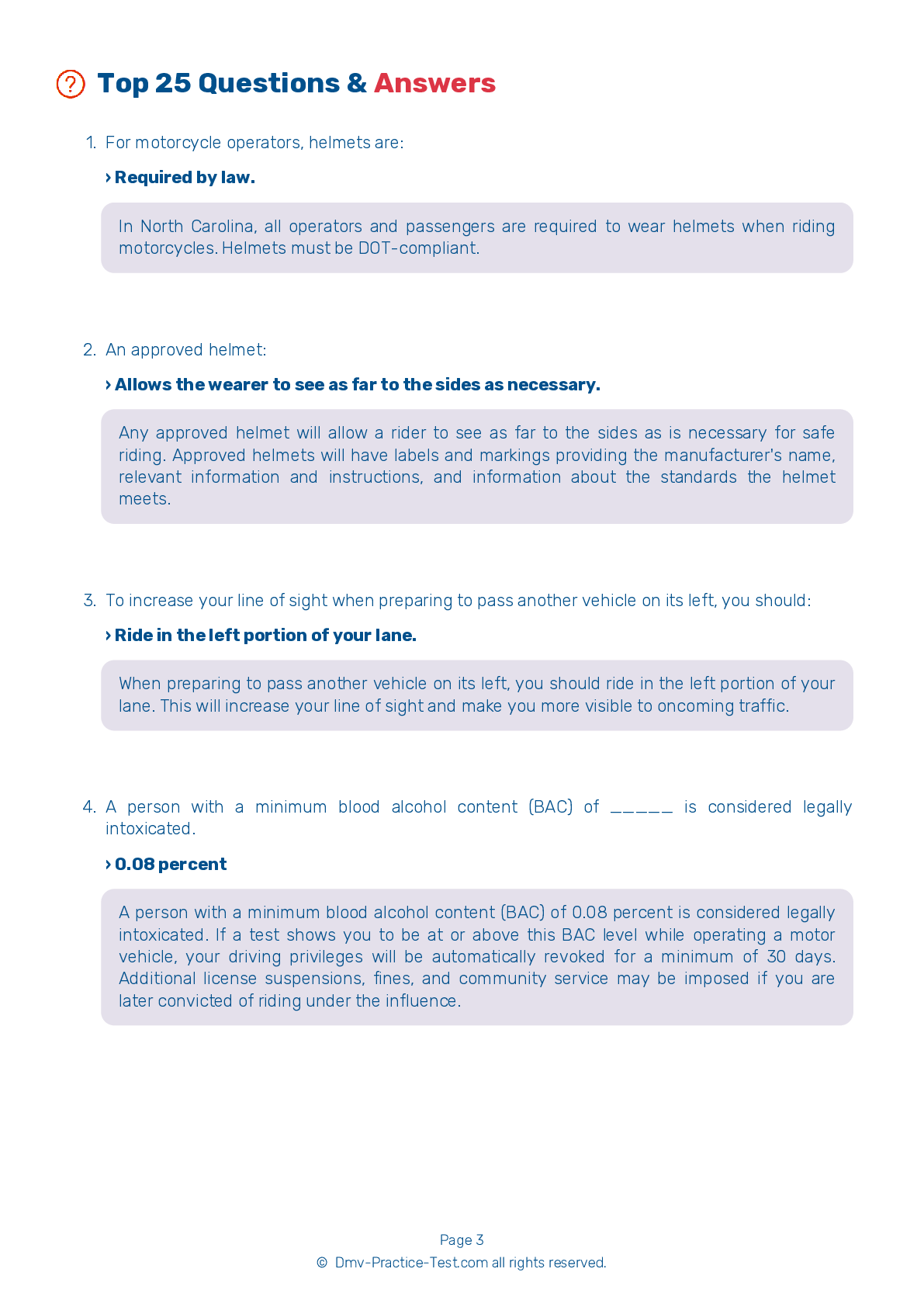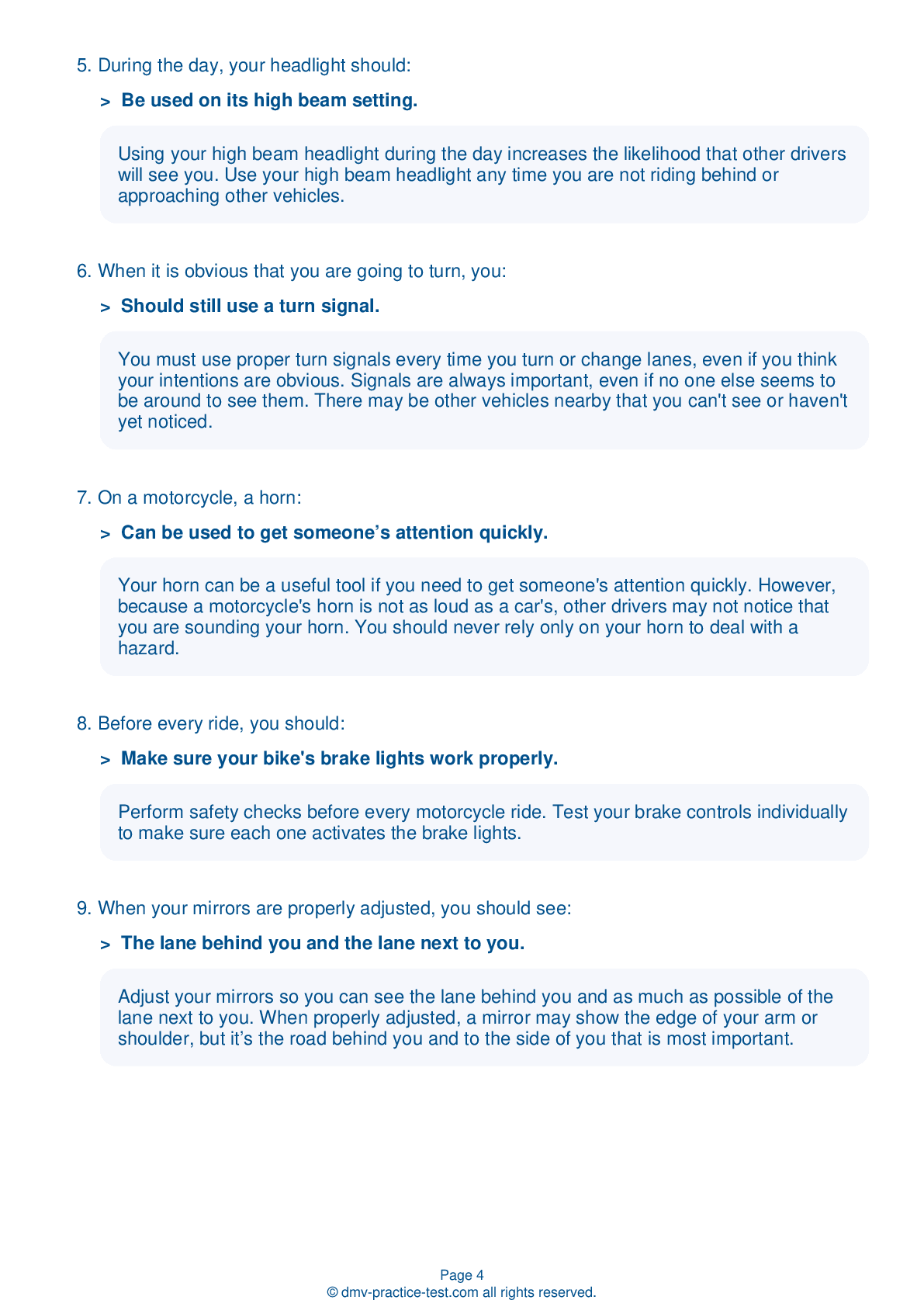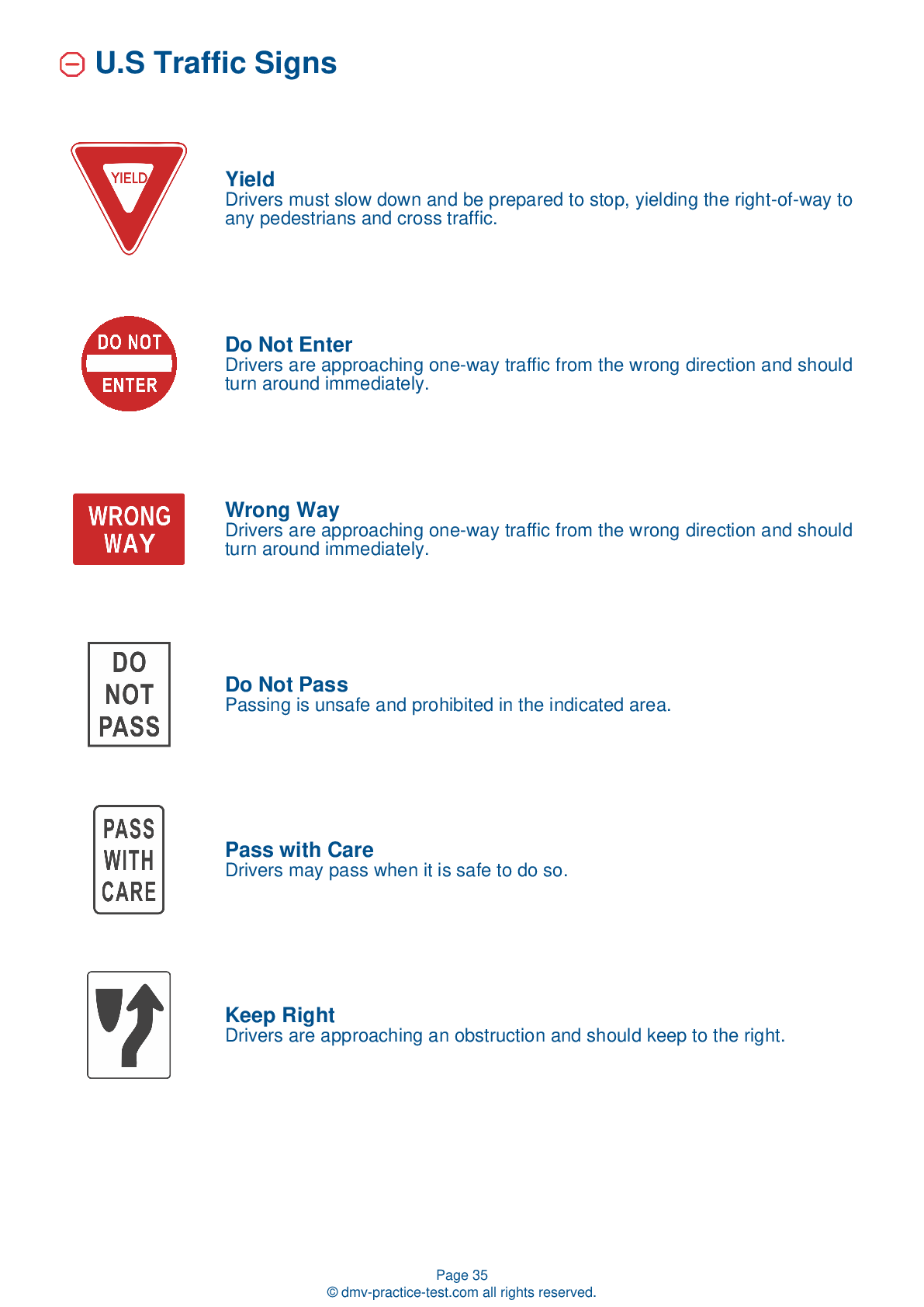DMV Permit Test #15
Motorcycle Test | License NC 2026 | FREE Online Practice! #15 Page 5 of 5
Take this FREE motorcycle test (license in NC 2026) to check your knowledge of the road rules. To improve your results, download a motorcycle handbook online, study theory, and practice for free on our website. Still worried about how to get a motorcycle license in North Carolina in 2026? Check our website for more sample tests, train as much as possible, and boost your grades!
25
20
16
21 . To lower the chance of a crash, you should do all of the following, except:
Hope another driver sees you.
To reduce your risk of being involved in a crash, you must ensure that you are visible to others on the road and that other drivers understand what you're planning to do. Clearly communicate your intentions through proper signaling and lane positioning. Maintain an adequate space cushion and scan your path of travel, identifying upcoming hazards and being prepared to react.
22 . When riding in traffic, it is important to remember that motorcycles:
Have only one blind spot.
Like any other vehicle, motorcycles have blind spots. Always turn your head to check for traffic in your blind spot before changing lanes.
23 . When braking, you should use:
Either the front or rear brake, but not both.
You should always use both brakes every time you slow or stop.
24 . Round signs indicate:
Upcoming railroad crossings.
Round signs warn road users about upcoming railroad crossing areas. Riders should use extra caution when approaching a railroad crossing.
25 . Where is the greatest potential for conflict between a motorcycle and other traffic?
Residential areas
The greatest potential for conflict between your motorcycle and other traffic is at intersections. Be extra alert when riding somewhere where another vehicle may cross in front of your path of travel.
Search the best driving school in your neighbourhood
2026 North Carolina | Frequently Asked Questions
In North Carolina, to acquire a motorcycle license, you must first have a regular driver's license. Then, you need to pass a motorcycle knowledge test, a sign test, and a vision test at your local DMV. Once these are passed, you'll receive a motorcycle learner's permit. After practicing with the permit, you can take the skills test to get your full motorcycle license.
In North Carolina, the minimum age for obtaining a motorcycle learner's permit is 16. However, if you're under 18, you must have a provisional, regular, or commercial driver license and pass the motorcycle knowledge test. A motorcycle safety course is recommended. At 18, you can apply directly for a motorcycle endorsement or license without needing a permit first.
Yes, in North Carolina, you need a dedicated motorcycle endorsement to legally ride a motorcycle. This can be added to your current driver's license. To obtain it, you must pass a written test, a sign test, and a motorcycle road test. If you don't have a regular driver's license, you can obtain a standalone motorcycle license.
To apply for a motorcycle driver's license in North Carolina, you'll need several documents. These include proof of age and identity (like a birth certificate or passport), social security card, proof of residency (like a utility bill or lease agreement), and if applicable, legal presence documents. If you're under 18, you'll also need a Driving Eligibility Certificate or high school diploma.
Yes, you will need to take a written exam for a motorcycle license in North Carolina. This test evaluates your knowledge of motorcycle operation, safety procedures, and road rules. However, if you successfully complete a state-approved motorcycle safety course, you may be exempt from taking the written test at the DMV.
The motorcycle written test in North Carolina covers a variety of subjects related to motorcycle safety and operation. These include understanding traffic signs and signals, rules of the road, safe riding practices, how to handle hazardous conditions, and motorcycle-specific laws. The test is based on the information found in the North Carolina Motorcycle Operator's Manual.
In North Carolina, completing a state-approved motorcycle safety education course can waive the written and skills tests required for a motorcycle endorsement. The course includes a written exam and skills test. So, if you pass the course, you've essentially passed these tests, and can present your completion card at the DMV to receive your endorsement.
Enrolling in a motorcycle training course in North Carolina involves finding a Motorcycle Safety Foundation (MSF) approved course near you. You can register online or by phone, depending on the provider. The course typically includes classroom instruction and hands-on training. Upon completion, you may be exempted from the skills test at the DMV for your motorcycle license.
No, it is not compulsory to own a motorcycle for the license test in North Carolina. You can use any motorcycle as long as it is properly registered, insured, and safe for use. However, the motorcycle must match the class of license you are attempting to obtain. For instance, a Class M license requires a motorcycle of over 50cc.
Yes, you can use a friend's motorcycle for the driver's license evaluation in North Carolina. However, make sure the motorcycle is properly registered, insured, and safe to operate. Also, you must have a way to legally transport the motorcycle to the testing location, as you cannot ride it there without a valid motorcycle endorsement or permit.
Yes, in North Carolina, the motorcycle driving exam tests several specific handling skills. These include your ability to start and stop, turn and swerve, and navigate through traffic. You'll also be tested on your understanding of road signs and signals, your ability to make safe decisions under pressure, and your overall control of the motorcycle.
Yes, in North Carolina, new motorcycle drivers who hold a learner's permit face several restrictions: they cannot ride at night, carry passengers, or ride outside of North Carolina. These limitations are lifted once the driver passes the skills test and obtains a full motorcycle endorsement. It's always wise to know and follow all local traffic laws.
Yes, your North Carolina motorcycle license or endorsement allows you to legally operate a motorcycle in other states. This is due to the Full Faith and Credit Clause of the U.S. Constitution, which requires each state to honor the public acts and judicial decisions of other states. However, you must adhere to the specific motorcycle laws of each state you visit.
Yes, in North Carolina, it is mandatory for all motorcycle riders and passengers to wear a helmet. This law applies regardless of age or experience level. The helmet must meet the Federal Motor Vehicle Safety Standard (FMVSS) 218, meaning it should be DOT approved. Non-compliance can result in fines and penalties.
Yes, in North Carolina, there are two types of motorcycle licenses: a full motorcycle endorsement (M) and a motorcycle learner's permit. The full endorsement allows unrestricted riding, while the learner's permit has limitations such as no night riding and no passengers. Both require passing written and skills tests, with the endorsement needing a regular driver's license as a prerequisite.
Yes, in North Carolina, you can add supplementary endorsements to your motorcycle license. This can include added qualifications like a commercial driver's license (CDL) or a school bus endorsement. Each endorsement requires additional testing and fees, so it's important to check with the North Carolina DMV for specific requirements.
Yes, in North Carolina, the motorcycle license test can be taken in languages other than English. The North Carolina DMV offers the test in several languages. However, it's advisable to contact your local DMV office beforehand to confirm the availability of the test in your preferred language.
An effective strategy to prepare for the motorcycle license test in North Carolina is to thoroughly study the state's motorcycle handbook. This guide covers all the information you'll need for the test. Additionally, taking practice tests available online can be very helpful. They simulate the actual test and help familiarize you with its format.
Yes, in North Carolina, the motorcycle written exam can be taken in languages other than English. The North Carolina DMV offers the test in multiple languages. However, it's best to contact your local DMV office in advance to confirm the availability of the test in your preferred language.
Yes, retaking is allowed in North Carolina if you don't pass the motorcycle written test on your first attempt. You must wait at least one day before retaking the test. If you fail three times, you'll need to wait a year from the date of the last failed attempt before you can try again.
